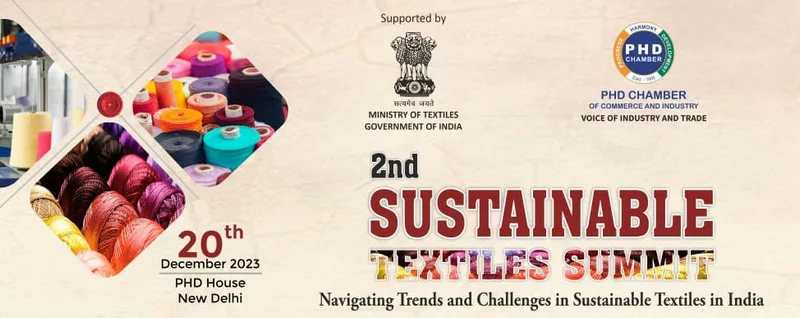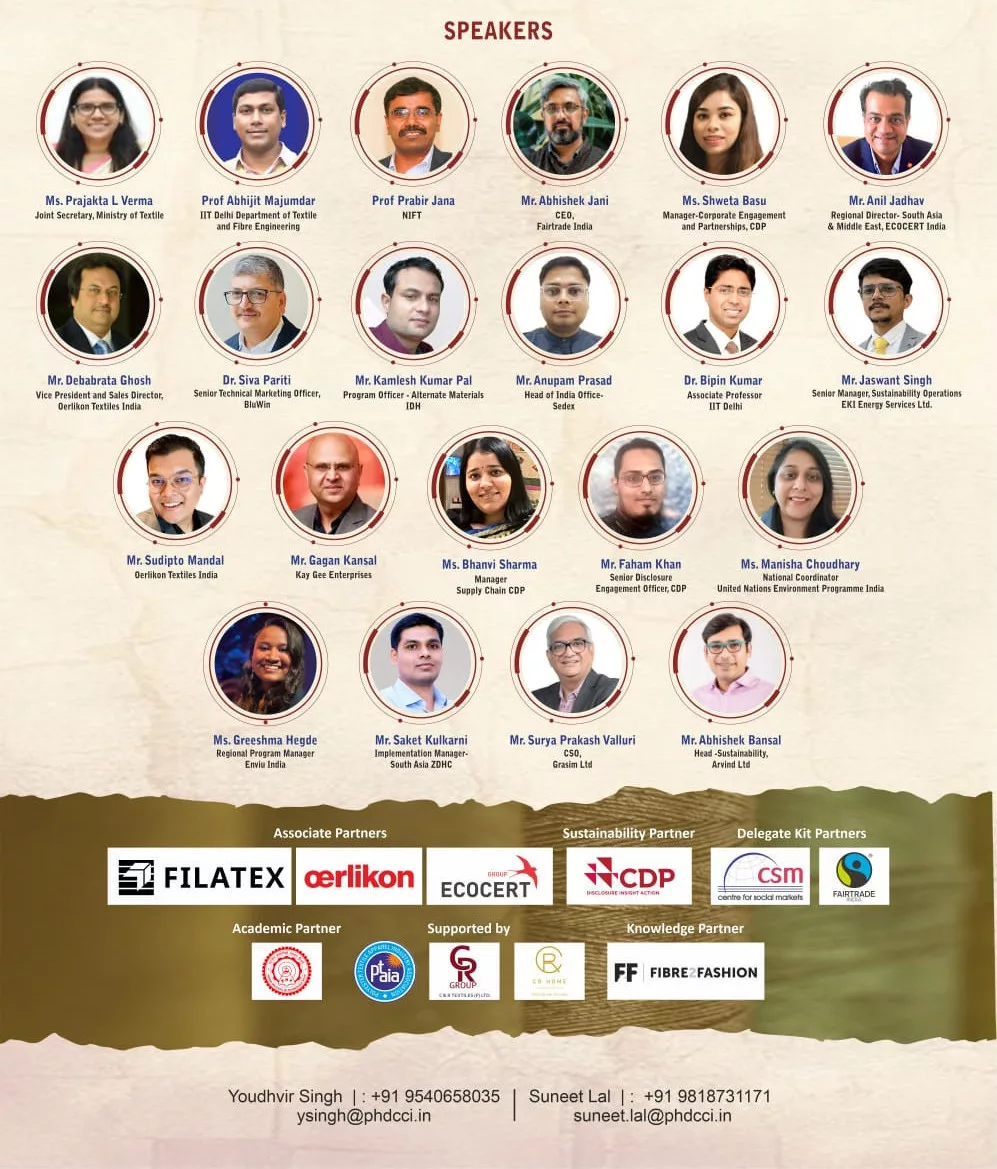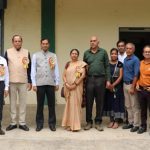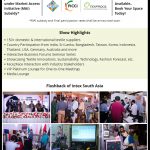
‘Navigating Trends and Challenges in Sustainable Textiles in India’
The 2nd Sustainable Textile Summit, ‘Navigating Trends and Challenges in Sustainable Textiles in India,’ was held on December 20, 2023, at PHD House in New Delhi.
During her address at Summit, Ms. Prajakta L Verma, Joint Secretary at the Ministry of Textiles, Government of India, underscored the imperative of traceability, recycling, and the promotion of sustainable practices within the textile industry
Highlighting the pivotal shift towards sustainability and circularity in the textile sector, Ms. Prajakta L Verma, Joint Secretary at the Ministry of Textiles, Government of India emphasized the critical role of forums like the Sustainable Textiles Summit in bringing key issues to the forefront. She shed light on the paradoxical nature of the textile industry, being the second-largest global employer yet also ranking as the second most environmentally polluting sector.
While acknowledging ongoing efforts to align the sector with sustainability standards, Ms. Verma identified key areas for enhancement. Traceability, exemplified by initiatives such as the Kasturi Cotton Initiative, was stressed as a foundational step. Public procurement emerged as a crucial factor to enhance visibility for upcycled and circular products. Addressing the challenge of textile waste management, Ms. Verma advocated for a dual approach of recycling and upcycling, proposing pilot projects with support from organizations like PHDCCI to create tailored solutions.

Ms. Verma concluded by calling for increased awareness and compliance with Environmental, Social, and Governance (ESG) principles, emphasizing the importance of distinguishing between fear-driven compliance and genuine concern for workers. She also provided insights into ongoing efforts, including an upcoming scheme focused on sustainability and circularity, targeting capacity building for MSMEs and awareness creation. This scheme involves stakeholder consultations, resource efficiency assessments, and budgetary interventions, with a suggestion to align with the World Bank’s RAMP initiative for the inclusion of Indian MSMEs.
In her multifaceted approach, Ms. Verma sought collaboration and assistance from PHDCCI in navigating challenges and promoting sustainable practices within the textile sector.
Mr. Madhu Sudhan Bhageria, Chairman of the PHDCCI Textiles Committee and Chairman and Managing Director of Filatex India Ltd, highlighted the pivotal role of Target Initiatives in empowering Indian textile companies amid the global shift towards sustainability. Urging the Ministry of Textiles to consider PHDCCI’s recommendations, he stressed the importance of financial support and tax initiatives for sustainability. His plea encompassed the establishment of dedicated R&D grants to support investments in sustainable technology, material innovation, and circular solutions. Mr. Bhageria further advocated for the enforcement of eco-friendly practices, such as organic cotton cultivation, water conservation measures, and responsible waste management.
Additionally, Mr. Bhageria proposed investments in green certification programs and the promotion of recognized certifications for sustainable textiles. Focusing on transparency, consumer trust, and awareness, he suggested launching education campaigns to inform consumers about the benefits of sustainable textiles. Mr. Bhageria expressed confidence that implementing these recommendations would position the Ministry of Textiles as a key player in propelling the Indian textile industry towards a sustainable future, enhancing competitiveness, creating green jobs, and contributing to a healthier environment. He also urged the Ministry to play an active role in fostering a thriving and sustainable textile sector in India.
Dr. (Prof.) Abhijit Majumdar, Institute Chair of the Department of Textile and Fibre Engineering at the Indian Institute of Technology, Delhi, underscored the immense scale of the textile industry, amounting to a $1,700 billion USD sector responsible for emitting 8% of the world’s greenhouse gases and utilizing 4% of global freshwater withdrawal. He drew attention to the concerning trend of doubled clothing production coupled with a 36% reduction in the average number of times a garment is worn.
Discussing strategies for a triple-helix approach, Dr. Majumdar outlined recommendations for the Textile & Clothing Industry, including designing for longevity and recycling, fostering consumer awareness, and collaboration with sorting and recycling agencies. He emphasized research and development in chemical recycling and automated sorting. For academia, he suggested focusing on less energy-intensive technologies, renewable fibers, circular business revenue models, and the social impact of circular practices in the textile and clothing curriculum. Dr. Abhijit called for long-term R&D funding for automatic sorting and recycling technologies.
Engaging with the government, he recommended subsidizing the high costs of circularity, providing tax rebates, making recycled fibers competitive, promoting public procurement of circular textiles, and launching awareness programs to reduce consumption. Dr. Abhijit emphasized the importance of a comprehensive and collaborative approach to address the environmental impact of the textile industry.
During the session, other prominent speakers made presentations were Mr Debabrata Ghosh, Vice President & Sales Director, Oerlikon Textile India Private Limited, Mr. Anil Jadhav, Regional Director, South Asia & Middle East, Ecocert, Mr. Abhishek Jani, CEO, Fairtrade India, Dr Srikanta K Panigrahi, Director General, Indian Institute of Sustainable Development (IISD) & Former Secretary, Govt. of India and Mr. Vineet Kumar, CEO, KVIC.
The 2nd Sustainable Textiles Summit received sponsorship from Oerlikon, Ecocert, and Filatex India as an Associate Partner. Fairtrade & CSM served as the Delegate Kit Partner, and the event garnered support from the Polyester Textile Apparel Industry Association and C&R Textiles. The Summit’s Knowledge Partner was Fibre2Fashion, and CDP India took on the role of Sustainability Partner.
Finally, the Vote of Thanks was presented by Mr. R K Vij, Co-Chair of the PHDCCI Textile Committee and Secretary General of the Polyester Textile Apparel Industry Association.
The day long Summit witnessed about 25 speakers, and over 250 delegates attended the Summit. The moderation of the Summit was done by Mr. Rakesh Kumar Sangrai, Director, PHDCCI.
The 2nd Sustainable Textiles Summit was sponsored by Oerlikon, Ecocert, Filatex India as Associate Partner, Fairtrade & CSM as Delegate Kit Partner, and supported by Polyester Textile Apparel Industry Association & C&R Textiles. The Knowledge Partner of the Summit was Fibre2Fasion and Sustainability Partner was CDP India. And PHDCCI annual sponsors: DLF Ltd, Jindal Steel & Power, KLJ Group, Multani Pharmaceuticals Ltd, Marble City, MMG Group, Radico Khaitan Ltd, Uflex Ltd, Vestige, Eazy ERP Technologies, JK Tyre & Industries Ltd, Sagar Group of Industries, Superior Industries Limited, Samsung India Electronics, Oswal Greentech, Apeejay Stya Group, Blossom Kochhar Beauty Products Pvt Ltd, DCM Shriram, R E Rogers, Trident Group, Ajit Industries Pvt Ltd, Bhagwati Plastic and Pipes Industries, Central Coalfields Ltd, DD Pharmaceutical Ltd., Hindware Sanitary, Jindal Steel, Modern Automobiles, and P S BEDI & Co.





